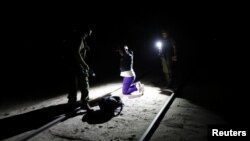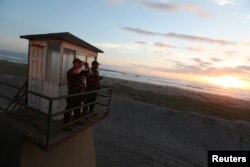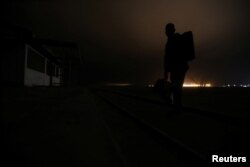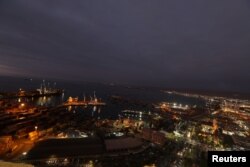In the pitch black of the moonless Chilean desert night, the Cuban man is hard to spot until he is within yards of the border.
Placing a small backpack of clothes on the ground, Yoniel Torres, 31, a father of two, puts his hands up as police approach with flashlights and take him into custody.
"A coyote (people trafficker) left me near (the Peruvian border town of) Tacna and told me to follow the old railway line," he tells Reuters as he is led away. "This is all horrible. The journey was so hard. I just came in search of a better life."
Scenes like this are replicated every day along Chile's long land border. The country is hardening its stance towards immigration, and refused to sign a United Nations migration pact last week aimed at improving migrant integration and protection.
Migrants leaving Haiti, Venezuela
Global attention largely falls on perilous Mediterranean Sea crossings and the uncertain fate of the Central American caravan at the U.S.-Mexico border. But Chile and other comparatively wealthy Latin American nations are absorbing another wave of mass migration from destitute nations in the region such as Haiti and Venezuela.
Some migrants, like Torres, travel up to 5,600 miles (9,000 km) by air and land to get as far as Chile. The country has the highest GDP per capita in South America, low levels of corruption and the lowest murder rate, according to figures from the World Bank and InSight Crime, a foundation that analyzes organized crime.
They endure Amazonian humidity then extreme temperatures and high altitude in the deserts between Peru, Bolivia and Chile.
Immigration into Chile has increased sixfold in less than 30 years, from 114,500 in the 1992 census, to 746,465 last year.
There has also been a spike in illegal migration. In the dusty Arica region at Peru's southern border, Chilean police say they caught more than 2,200 foreigners attempting to enter the country illegally between January and November, up 80 percent from the previous year.
Landmines are real
Guided in many cases by traffickers paid as much as $3,000, police say, the migrants cross in remote areas to avoid border guards, risking a fatal encounter with landmines planted on the frontier decades ago on the orders of former dictator Augusto Pinochet.
Javiera Lopez, Arica's chief prosecutor, says migrants often suffer sexual assault and robberies on the journey.
"There are scars that might never heal, not only from the journey but also once in Chile because they find the situation is totally different to the one they thought they would find," he says.
Precarious existence
Those who make it to Chile often live a precarious existence. Haitians, Dominicans and Bolivians live cheek by jowl in tumbledown neighborhoods such as Arica's Cerro Chuno, scraping together a living working in restaurants and mines.
Racism and job discrimination is common.
The 29 countries who refused to sign the U.N. Migration Pact argue that it undermines their sovereignty.
"People have a right to leave their country when they feel it is right," Chilean Foreign Minister Roberto Ampuero told a Senate committee last week. "But ... they cannot go to any country they want to."








